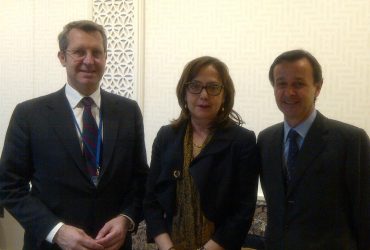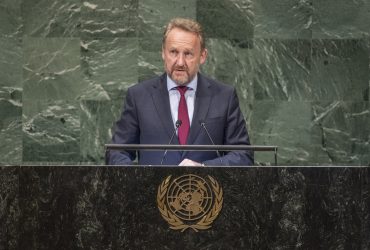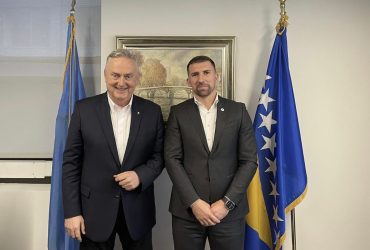UNAOC Side Event: Religious Communities’ Role in Genocide Prevention
The UN Alliance of Civilizations and the Office on Genocide Prevention marked the 75th Anniversary of the Genocide Convention with a crucial side event focused on “The Role of Religious Communities in Upholding and Implementing the Genocide Convention.” The side event was chaired by Ms. Alice Wairimu Nderitu, Under-Secretary-General, Special Adviser of the UN Secretary-General on the Prevention of Genocide and Mr. Miguel Angel Moratinos, Under-Secretary-General, High representative for the UN Alliance of Civilizations
Dr. Zlatko Lagumdzija, Bosnia and Herzegovina’s Permanent Representative to the UN, drew on his nation’s history as a survivor of aggression and genocide. He highlighted the complex relationship between religion and genocide, citing instances where religious rhetoric fueled atrocities. He emphasized the pivotal significance of preventing and penalizing genocide, acknowledging that while history reveals instances of religion fueling heinous crimes, the Genocide Convention designates religious groups as protected entities.
Despite this dark history, Lagumdzija emphasized Bosnia and Herzegovina’s strides toward reconciliation. He praised initiatives like the Inter-Religious Council and a joint Master’s program in Inter-Religious Studies and Peace Building as beacons of hope for fostering dialogue and understanding among diverse religious communities.
Religion, Atomic Energy, and Artificial Intelligence have one thing in common – they can be source of creations or destructions of humankind prosperity. But it is still in our hands, human hands, in which way they will go – constructive or destructive.
In his closing, Lagumdzija urged the global community to recognize the potential for both creation and destruction within religion, atomic energy, and artificial intelligence. He advocated for international bodies to regulate these forces positively and echoed the need for support towards initiatives promoting peace, envisioning a world where genocide education moves from courtrooms to classrooms.
The event concluded emphasizing humanity’s ability to steer these powerful forces toward constructive pathways for a more harmonious world.
______________________________________________________________________________________
United Nations Alliance of Civilizations (UNAOC)
United Nations Office on Genocide Prevention and the Responsibility to Protect
Side Event to the 75th Anniversary of the Convention on the Prevention and Punishment of the Crime of Genocide
“The Role of Religious Communities in Upholding and Implementing the Genocide Convention”
Charring by Ms. Alice Wairimu Nderitu, Under-Secretary-General, Special Adviser of the UN Secretary-General on the Prevention of Genocide and Mr. Miguel Angel Moratinos, Under-Secretary-General, High representative for the UN Alliance of Civilizations
Statement of dr Zlatko Lagumdzija, Permanent Representative of Bosnia and Herzegovina to the United Nations
Your Excellences, Dear Friends,
I want first to thank USG Alice Nderitu, and USG Miguel Angel Moratinos for their noble and indispensable work and passion in building one of the key preconditions for any progress that is so much needed to this unjust, unequal and conflicting world – the talk and walk along Prevention and Punishment of the Crime of Genocide.
As a still live witness and survivor of aggression on sovereign, independent and UN member state of Bosnia and Herzegovina, the country of last 20th century ICTY verdict genocide site Srebrenica, I would like to share few thoughts on this important matter – the Role of Religious Communities in Upholding and Implementing the Genocide Convention.
Unfortunately, it would be easy to take a few steps back into history and come up with a rather uncomfortable number of examples where religion gave fuel to the most serious of crimes, including genocide. It would be easy to surmise that religion was both instrumentalized by individuals, used and abused to no uncertain levels for the perpetration of genocide.
It is for those very reasons that religion is a first connection when designating a protected group per the Genocide Convention.
Which leads me to crimes and genocide committed in Bosnia and Herzegovina as well. Here, the role of religious leaders, and the nexus between religion and genocide is exceptionally complex. Numerous and quite blatant were videos of religious clergies blessing soldiers who would later slaughter men, women and children in cold blood.
A key facet of genocide incitement and commission in the Bosnian genocide was the role of religious rhetoric, mythology, and symbolism, particularly when espoused or tacitly condoned by perceived “legitimate” religious and political authorities.
Examples of crimes go as far as the most disturbing biblical references not in the form of words but actions, were people were crucified in front of their families onto trees and wooden crosses.
During military operations in Bosnia and Herzegovina 1992-1995 or subsequent conquests, more than 80% out of 1.144 mosques that existed in 1992, were predominant target of destruction , while in far lesser number Orthodox and Roman Catholic churches and monasteries were not spared either.
But coming from a country that considers its multi-religious diversity as enriching rather than constraining, we have long come to learn to separate individual evil from the beauty that is each religion in Bosnia and Herzegovina.
The majority of us living in Bosnia-Herzegovina, who identify both as religious and non-religious, believe that religious leaders and lay people have a significant role to play in reconciliation efforts. For many religious leaders were seen as more important to reconciliation and building trust than politicians.
The best-documented segment of Inter-Religious Dialogue history in Bosnia and Herzegovina is the establishment and work of the Inter-Religious Council (IRC) since 1997. The senior leaders and representatives of Catholic, Jewish, Muslim and Orthodox community are convening on a regular basis in order to try a be part of stakeholders reconciliation and shared prosperity ecosystem.
One of substantive concrete examples of long term thinking and acting is a Master’s program “Inter religious Studies and Peace Building” jointly run by three theological faculties in Bosnia as one of the significant post war concrete steps in comprehensive process based on dialogue, respect, learning and understanding toolkit. The idea came from the Catholic Relief Services Office in Sarajevo in 2016 to launch a joint master’s program by the Faculty of Islamic Studies, Catholic Theological Faculty and Orthodox Theological Faculty.
To conclude.
Religion, Atomic Energy, and Artificial Intelligence have one thing in common – they can be source of creations or destructions of humankind prosperity. But it is still in our hands, human hands, in which way they will go – constructive or destructive.
For regulating and directing beneficiary AE UN created International Atomic Energy Agency (IAEA). For the same purpose hope we will better sooner than later come to UN establishing International Artificial Intelligence Agency (IAIA).
Hope that we will all try to find a way of supporting similar pathways already established in 2019 by Pope Francis and Grand Imam of Al Azhar Ahmed Al Tayeb signing “Declaration on Human Fraternity for World Peace and Living Together”.
I see Convention on the Prevention and Punishment of the Crime of Genocide as a major peace of a puzzle in great Mozaic of Alliance of Civilizations and Human Fraternity where genocide will ultimately move for good from court rooms to classrooms.
Thank you



